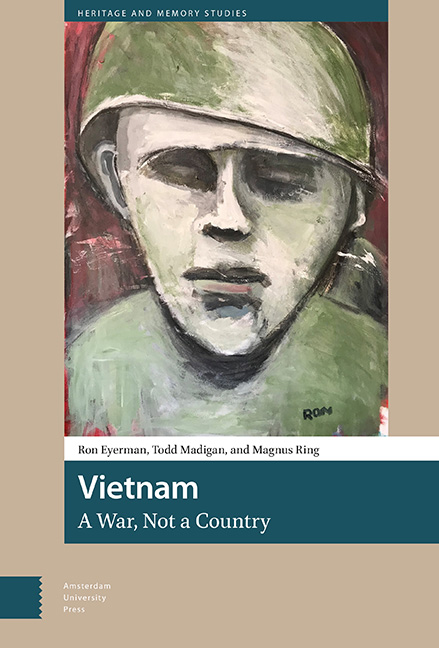Book contents
- Frontmatter
- Table of Contents
- Preface
- 1 Introduction: Cultural Trauma and the American-Vietnamese War
- 2 Cultural Trauma and Vietnamese Arenas of Memory
- 3 The Trauma of Vietnam: The American Perspective
- 4 Journey From the Fall
- 5 Cultural Trauma and Vietnamese-American Arenas of Memory
- 6 Conclusion: War, Trauma, and Beyond
- Index
3 - The Trauma of Vietnam: The American Perspective
Published online by Cambridge University Press: 29 November 2023
- Frontmatter
- Table of Contents
- Preface
- 1 Introduction: Cultural Trauma and the American-Vietnamese War
- 2 Cultural Trauma and Vietnamese Arenas of Memory
- 3 The Trauma of Vietnam: The American Perspective
- 4 Journey From the Fall
- 5 Cultural Trauma and Vietnamese-American Arenas of Memory
- 6 Conclusion: War, Trauma, and Beyond
- Index
Summary
Abstract
The chapter traces the “meaning struggle” as carried out in the various arenas of memory in the United States. Central concepts and themes in the official narration of the war are identified and discussed, such as the “Vietnam Syndrome” and the “lessons” drawn from the lost war. Could the war have been won, was it a “failure” from the beginning and thus a “tragic mistake”? The counter-narratives developed in the powerful antiwar movement are also given a central place in the chapter. Mass media and popular culture representations of the war are discussed in detail. Artworks, novels, and other forms of aesthetic representations are included, most especially those produced by veterans. The chapter concludes by arguing that the American war was the cause of cultural trauma in the United States.
Keywords: imagined community, American exceptionalism, Vietnam generation, Cold War
We know that for years now, there has been no country here but the war.
Michael Herr, 1968A just memory…recall(s) the weak, the subjugated, the different, the enemy, and the forgotten. Viet Thanh Nguyen, 2016: 17
For too long, we have lived with the “Vietnam Syndrome”.… It is time we recognized that ours was, in truth, a noble cause. A small country newly free from colonial rule sought our help in establishing self-rule and the means of self-defense against a totalitarian neighbor bent on conquest. We dishonor the memory of 50,000 young Americans who died in that cause when we give way to feelings of guilt as if we were doing something shameful, and we have been shabby in our treatment of those who returned. They fought as well and as bravely as any Americans have ever fought in any war. They deserve our gratitude, our respect, and our continuing concern. Ronald Reagan, 1980 speech before the VFW national convention, while campaigning for the American presidency
As the North Vietnamese forces approached the outskirts of Saigon on April 29, 1975, approximately 1,000 Americans remained in the city. They were mostly support personnel, both military and civilian, left to administer American interests. Among them was a contingent of U.S. Marines hastily sent in to protect the American embassy and its staff.
- Type
- Chapter
- Information
- Vietnam, A War, Not a Country , pp. 103 - 192Publisher: Amsterdam University PressPrint publication year: 2023



